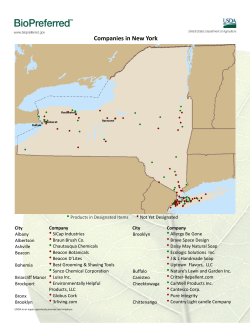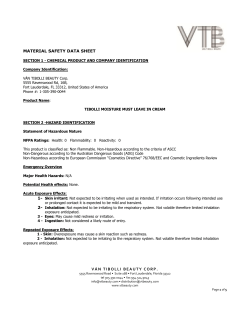
Document 197778
How to Play Utica Opportunities of a Lifetime: Neal Dingmann The Energy Report www.TheEnergyReport.com COMPANIES MENTIONED Anadarko Petroleum Corp. Chesapeake Energy Corp. ConocoPhillips Devon Energy Corp. Exxon Mobil Corp. Gulfport Energy Corp. Magnum Hunter Resources Corp. Progress Energy Resources Corp. Rex Energy Corp. Royal Dutch Shell Plc Neal Dingmann SunTrust Robinson Humphrey Tel.: (713) 247-7900 neal.dingmann@suntrust.com Streetwise Reports LLC 101 Second St., Suite 110 Petaluma, CA 94952 Tel.: (707) 981-8107 Fax: (707) 981-8998 bfung@streetwisereports.com THE ENERGY REPORT THE GOLD REPORT THE LIFE SCIENCES REPORT THE CRITICAL METALS REPORT 07/10/2012 The Utica is one of the best plays in the U.S., not just because it's new, but because its potential is not fully known, according to Neal Dingmann, managing director of investment bank SunTrust Robinson Humphrey. While lagging well results have kept the Utica a hidden gem, several companies are poised to reveal impressive results. Dingmann discusses undervalued companies capitalizing on the play in this exclusive interview with The Energy Report . Source: Brian Sylvester of The Energy Report The Energy Report: Neal, Malaysian crown corporation PETRONAS recently reached a merger and acquisition (M&A) deal to buy Canada's Progress Energy Resources Corp. (PRQ:TSX) for CA$5.5 billion ($5.5B). Progress, primarily a natural gas play, received a 77% premium to the company's closing price the day before the deal. What is the broader message investors should take away from that takeover? Neal Dingmann: The North American M&A market continues to be very strong. While there has been volatility in commodity prices and energy stocks, one thing that has helped is that the M&A environment has remained quite stable. In fact, it has been on the upswing. This takeover is another sign of that. The long-term implications are pretty clear. Despite the volatility in gas prices, there is long-term confidence in natural gas prices and other large companies that should cause deal values to remain at sizeable premiums. TER: Does it indicate that investors are willing to pay a premium for gas assets or just these gas assets? ND: These assets are considered above average, but, in general, investors are willing to pay more for many gas assets. It's much like when Exxon Mobil Corp. (XOM:NYSE) bought XTO Energy Inc. not terribly long ago. At that time, Exxon was also willing to pay a premium despite the volatility and weakness in gas prices. TER: Are more natural gas takeovers on the way? ND: I believe so. There may not be as many dry gas takeovers in North America initially. There have clearly been a lot of liquids-related deals. I still expect there to be a number of takeovers and buyouts. The most tempting M&A targets will have diversified gas and liquid assets. TER: You recently told Bloomberg that you're "cautious" on natural gas and "quite bullish" on oil. Please elaborate on your positions. ND: I'm cautious about the near- to medium-term forecast for natural gas. Most of these newer oil and gas plays, whether it's the newer Utica play, or a more "The M&A environment has remained quite stable. In fact, it has been on the upswing." established play like the Bakken, have a sizeable amount of associated gas. My fear is that even if the dry gas plays, such as the Haynesville or the Barnett, continue to see production fall, that will be more than offset by the increase of the associated gas from some of these newer liquid or oil plays. I don't necessarily think that's going to be the case, on a long-term basis, but it still does have me quite cautious in the near term. Some analysts have recently cut their oil forecasts. But one thing that continues to make oil different from any other sector is oil's high depletion rate. And many newer oil plays have higher depletion rates than past averages. My bullish sentiment is largely based on that along with likely continued incremental demand. TER: Chesapeake Energy Corp. (CHK:NYSE) is facing up to a $20B shortfall in cash flow. Corporate governance issues ultimately resulted in Chief Executive Aubrey McClendon being replaced as chairman by Archie Dunham, former chairman of ConocoPhillips (COP:NYSE). Chesapeake has sold some assets and is looking to sell even more. Where others see a troubled company, you see value. In fact, you have a Buy rating on Chesapeake. Tell our readers why this story could get better. ND: You've brought up a lot of good points. I try to boil exploration and production (E&P) companies down to asset value, whether it's Chesapeake or a smaller, simpler story. My analysis still shows that, after all the assets that Chesapeake is scheduled to sell, it still has four to five large liquid plays where it's either the No. 1 or No. 2 industry participant. And this is without attributing value for its many gas plays where it's in first or second place. The M&A market remains very hot and its asset value is clearly much more than where the stock price is today, even if its $13B debt is backed off. TER: Chesapeake recently put 337,000 acres in the Utica Shale up for sale. What do you expect that to fetch and who are some likely buyers? ND: The Utica is the hottest play in the U.S., not just because it's new, but because of its potential. I've heard it could have some of the best economics of any area in the U.S. Unfortunately for Chesapeake, some of the portion it put up for sale is on the fringe. It is also keeping a core holding for itself. Therefore, it won't fetch the $10,000+ valuation per acre that some of the core acres could get, but could still receive over $2,500 per acre. There likely will still be a relatively large number of companies looking at it, including some of the big players that are already in the play, such as Royal Dutch Shell Plc (RDS.A:NYSE; RDS.B:NYSE), as well as majors like Exxon that are looking for big growth packages. It's very difficult, especially onshore in the U.S., to find any sort of large acreage blocks like this. Besides, a lot of the players that are already in the Utica are potential targets for other large E&Ps that would like a presence. "The Utica is the hottest play in the U.S. A lot of the players there are potential targets for other large E&Ps." TER: The Utica has been flying under the radar of most oil and gas investors. A June 25 SunTrust Robinson Humphrey report said that's going to change soon. Why is this play on the rise? ND: It was under the radar prior to early well results being released by Chesapeake late last year. Prior to that, there was just a dearth of results. A lot of that has to do with having to rest or shut-in these wells once they're completed. Companies that have shut-in wells have to let them rest before they start releasing results. Many wells are on the verge of production. In fact, I've heard Chesapeake alone could have as many as 20 wells that could be released by the end of July. Once a number of well results are released by Chesapeake, Gulfport Energy Corp. (GPOR:NASDAQ), Rex Energy Corp. (REXX:NASDAQ) and Anadarko Petroleum Corp. (APC:NYSE) among others, the play is likely to start attracting investor interest again. TER: What are some of the more prospective counties that investors can zero in on? ND: That's one thing about the Utica—nobody knows for sure where the best prospective or core counties would be. Based on channel checks and conversations that I've had I would say eastern Ohio—Carroll, Harrison and Guernsey counties—even as far south as Monroe and Noble counties. But nothing has been clearly established. TER: Do you expect to see other wells like Chesapeake's Buell 8H well, which is producing 9.5 million cubic feet per day (MMcf/d) of natural gas and 1,400 barrels of oil per day (bbl/d) even after several months of production? ND: The Buell well was not just a great well "Commodity prices should for the Utica, but it's essentially one of the be strong enough to support best wells I've seen in the U.S. period. Even higher prices in a number though it was that good, there is a chance of E&P stocks." that there are others at least that good and maybe even better. There are companies, such as Gulfport, that have wells with more frack stages. There was even speculation a couple weeks ago that a private producer in Monroe County produced a well that was doing over 3,000 boe/d and over 1,900 barrels a day (bbl/d) of condensate, which would make it a better well than the Buell. TER: We've seen the emergence of different shale plays over the last few years, but it seems like new shale plays continue to trump the others. Today it's the Utica. Is there more to come? ND: There will always be new discoveries. A lot of that has to do with the continuation of advanced technology. We are talking about being able to drill horizontally underneath the ground up to several miles. Technology continues to advance the chances that there will be another play. Will there be plays that surpass something as good as the Bakken, the Permian and the Utica? That's tough to say. Do I think we'll find other large shale plays? I do. TER: What are some of the companies operating in the Utica that could ride positive well results and boost investor sentiment? ND: Chesapeake is still No. 1 despite all the recent noise that the company has had. If the Utica does work out as I expect, I can't imagine that the 100-pound gorilla wouldn't start to gain some traction. Others that are a bit more leveraged are Gulfport Energy, REX and PDC Energy Inc. (PETD:NASDAQ). All three of those have very solid acreage positions in the play. Two large ones would be Anadarko and Devon Energy Corp. (DVN:NYSE). TER: Where is Rex's shale acreage? ND: Nearly all of its position is in Carroll County, which is very positive. It's one of the best counties. Its position is also in one continuous block versus being scattered around, which is important. TER: Have condensates been discovered in any of the wells? ND: There's been a fair amount of condensate in that area. We're clearly going to learn more over the next three to five months. I would predict that the area will probably contain around one-third oil, one-third liquids and one-third gas. TER: What's your outlook for Gulfport? ND: Its baseline oil production in the Gulf Coast coupled with its upside in the Utica could make for a very exciting year. But a lot of investors haven't factored its very significant oil sands position into their valuations. It owns 25% of Grizzly Energy, which has a very large position at Fort McMurray, Alberta. First production there is supposed to be around the second quarter next year (Q2/13), which could be very positive for Gulfport's stock. My target for Gulfport is $45. It's still only trading around $20. TER: What about Rex? ND: I have a higher price target on Rex than the current share price, which is driven from the massive production growth of around 90% sequentially this year coupled with approximately 50% sequentially next year, all of which is mostly in the liquids part of the Marcellus, though its new Utica play in Ohio should also help. TER: And Chesapeake? ND: I've got a higher price target on Chesapeake than the current share price that is driven by incremental cash flows, mostly from the company's liquid assets. The company clearly has even more upside if natural gas prices begin to rally above $3/Mcf. TER: Magnum Hunter Resources Corp. (MHR:NYSE.A) is another play that's got some acreage in the Utica. When will it be drilling and how soon could we get results? ND: Magnum has attractive acreage in Monroe County. The issue that I see with Magnum in the near term is that it doesn't quite have the infrastructure necessary to process and transport the commodities. There could be a well drilled there in the coming months with a very brief test period on it, which could get us some results. However, it will be very difficult to see an actual flow rate for Magnum Hunter this year in the Utica because of the infrastructure constraint. TER: What should oil and gas investors look for through the end of the year? ND: We clearly had a volatile first half of the year. I don't think that level of volatility will continue, but the markets could still remain quite choppy. Both oil and gas could be a bit range bound through at least early next year. Oil could be somewhere from $80–95/bbl. Natural gas has likely already experienced the lowest levels it could see in some time with it likely trading somewhere around $2.50–3.50/Mcf well into next year. However, these commodity prices should be strong enough to support higher prices in a number of E&P stocks versus today's current levels. TER: Thank you, Neal. Neal Dingmann covered 30+ companies in the exploration and production and oilfield services sectors as an analyst at Wunderlich Securities. He has held similar positions at Dahlman Rose & Co., Pritchard Capital Partners, RBC Capital Markets and Banc of America Securities. He has been recognized by The Wall Street Journal and Institutional Investor. He holds a Master of Business Administration from the University of Minnesota and a Bachelor of Arts in business from the University of Arkansas. Want to read more exclusive Energy Report interviews like this? Sign up for our free e-newsletter, and you'll learn when new articles have been published. To see a list of recent interviews with industry analysts and commentators, visit our Exclusive Interviews page. The Gold Report : The Energy Report : The Critical Metals Report : The Life Sciences Report IMPORTANT DISCLOSURES 1) Brian Sylvester of The Energy Report conducted this interview. He personally and/or his family own shares of the following companies mentioned in this interview: None. 2) The following companies mentioned in the interview are sponsors of The Energy Report: Royal Dutch Shell Plc. Streetwise Reports does not accept stock in exchange for services. This interview was edited for clarity. 3) Neal Dingmann: I personally and/or my family own shares of the following companies mentioned in this interview: None. I personally and/or my family am paid by the following companies mentioned in this interview: None. I was not paid by Streetwise Reports for participating in this interview. The Gold Report , The Energy Report and The Life Sciences Report do not render general or specific investment advice and do not endorse or recommend the business, products, services or securities of any industry or company mentioned in this report. From time to time, Streetwise Reports LLC and its directors, officers, employees or members of their families, as well as persons interviewed for articles on the site, may have a long or short position in securities mentioned and may make purchases and/or sales of those securities in the open market or otherwise. Streetwise Reports LLC does not guarantee the accuracy or thoroughness of the information reported. Streetwise Reports LLC receives a fee from companies that are listed on the home page in the "Learn More About Companies in this Issue" section. Their sponsor pages may be considered advertising for the purposes of 18 U.S.C. 1734. OTHER DISCLOSURES Streetwise - The Gold Report , The Energy Report and The Life Sciences Report are Copyright © 2012 by Streetwise Reports LLC. All rights are reserved. Streetwise Reports LLC hereby grants an unrestricted license to use or disseminate this copyrighted material (i) only in whole (and always including this disclaimer), but (ii) never in part.
© Copyright 2025











